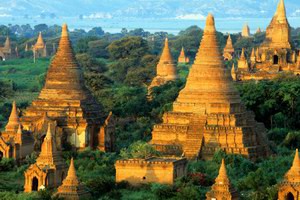MT Sobek
Truly off the beaten path, Tajikistan holds one of Central Asia's best trekking destinations, the Fann Mountains. A part of the western Pamir-Alaya massif in Sughd province, the Fanns boast about a hundred peaks, several rising over 16,000 feet. Admire them all on this trekking journey that offers a deep dive into the Tajik culture and the country's unspoilt nature. Cross passes that showcase enchanting vistas of soaring peaks, and marvel at idyllic glacial lakes. Along the way, camp under starlit skies and encounter the warmth of Tajik hosts.
Highlights:- Take a break from civilization on this epic 9-day trek in the remote Fann Mountains
- Admire majestic peaks over 16,000 feet, including Chimtarga, Bodkhona, Mirali and Energia
- Explore Tajikistan's Buddhist and Sogdian roots, and over 1,500 years of history
Important Trip Details:On this trek you will be hiking 5 to 8 hours a day for 9 days, mostly at elevations above 8,000 feet. The trails are moderately difficult and rocky over the Alauddin Pass (12,238 feet). You need to be in very good physical condition and have similar previous experience of hiking and sleeping at high altitudes.
Minimum Age: 14
Featured Destinations
|
Alauddin Lake
|
|
|
Zimtut
|
|
|
Lake Pushtikul
|
|
|
Munora Pass
|
|
|
Fann Mountains
|
|
Dushanbe
Dushanbe
Tajikistan's capital, nestled south of the Ferbana valley and west of towering Pamir Mountains, has a population of about 700,000. It wasn't always the premier city in the country: Until 1926, Dushanbe was a tiny village whose main importance was a market held every Monday (the city's name means Monday in Tajik). Then the railroad came to town and transformed the sleepy hamlet into a major transportation hub. That led to a lot of Soviet-style architecture, which gives the city a modern, uninspired look. Nonetheless, tree-lined streets and avenues, four big squares, numerous parks and impressive government buildings lend the city a certain charm. The prominent showpiece in Dusti Square is a new, multimillion-dollar monument to Ismail Somoni, who founded the Central Asian Somonid Dynasty in AD 895. The biggest attractions are the markets. The covered market behind the Hotel Tajikistan sells Iranian and Chinese clothes, foodstuffs and electronics. Very few crafts are displayed because there have previously not been many visitors there to buy the goods. The bozori abz (green market) east of Aini Square sells fruits, vegetables and flowers. Other attractions include the motley Tajikistan Unified Museum (stuffed animals and ex-Soviet memorabilia), the Ethnographic Museum (traditional handicrafts), the Museum of National Antiquity (religious artifacts including an awesome reclining stone Buddha), the Rokhat teahouse, the Aini Square and Memorial Complex and the Aini Opera and Ballet House (both named after Sadriddin Aini, the father of Tajik literature). Note that many streets have recently changed (and may change again in the future) from their Soviet-inspired names to more Tajik-centric versions; finding your way around town can often be a frustrating endeavor, as even many locals won't know the current name of the street they are walking on. After you've exhausted the possibilities in town, take a day trip to Hissor Fortress, 18 mi/30 km away. The stronghold, built in the 18th century and abandoned after 1920, was once the residence of the Turko-Mongric rulers. If time allows, other excursions can be made to Adzhina-Tepe (an ancient Buddhist monastery) and to the Varzob Gorge, the site of a health resort and thermal springs. Though a major hike from the gorge, the springs and resort will appeal to those who feel that hot radon steam is therapeutic. The Ramit Nature Reserve is not far away.
|
Destination Guide
|
View Full Itinerary
Valid Date Ranges
-
July 2025
| 07/25/2025 |
08/07/2025 |
$3,995 per person
|


 1.800.266.3476
1.800.266.3476

